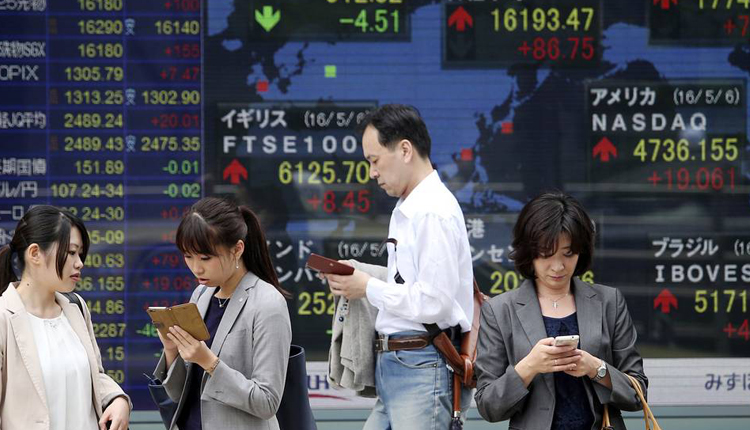Asian stocks mostly rose on Wednesday afternoon amid positive sentiment on the U.S.-China trade front.
The mainland Chinese markets were higher by the end of the morning session. The Shenzhen component rose 1.281 percent and the Shenzhen composite gained 1.186 percent. The Shanghai composite recovered from earlier losses to see gains of 0.94 percent.
Meanwhile, Hong Kong’s Hang Seng index added 0.8 percent.
Japan’s Nikkei 225 extended gains from the previous session, rising 1.41 percent as the Topix index advanced 0.98 percent. South Korea’s Kospi also gained 0.38 percent.
The ASX 200 in Australia, on the other hand, shed earlier gains to slip 0.36 percent in afternoon trade. Oil company Beach Energy surged 6.07 percent after it announced increased sales revenue and improved guidance in its half year report for the 2019 financial year.
The broad MSCI Asia ex-Japan index traded higher by 0.49 percent at 516.19 as of 12:25 p.m. HK/SIN, holding near levels not seen since Oct. 2018.
Trump may postpone trade deadline
U.S. President Donald Trump said Tuesday that he was open to postponing the March 2 deadline for tariffs if Washington and Beijing can reach a trade deal soon.
Trump softened his stance on the trade battle with China, saying he’s open to letting the deadline slide, but “would prefer not to.” He also said Beijing “very much wants to make a deal,” and he has “a big team” in China trying to reach a resolution.
When asked if he will meet Chinese President Xi Jinping at the end of March, Trump said, “Not at this point.”
Trump’s comments came as the U.S. and China attempt to strike a deal amid an ongoing trade fight between the two economic powerhouses.
The March 2 deadline is crucial in the negotiations as U.S. tariffs on Chinese goods will increase if a deal is not struck before then. Treasury Secretary Steven Mnuchin, along with U.S. Trade Representative Robert Lighthizer, are in Beijing this week for another round of negotiations with Chinese Vice Premier Liu He.
A morning note from strategists at DBS Group Research sounded a warning “not to count the chickens before they hatch.”
“The pendulum on whether a US-China trade deal could be struck has been swinging with US President Donald Trump’s comments on his on/off meeting with China President Xi Jinping to extending talks beyond the 1st of March. The extension will only be possible if China accedes to US’s push for enforcement mechanisms on areas such as forced technology transfer and intellectual property protection,” they said.
“I’m expecting what I’ve said all along,” Andrew Collier, managing director at Orient Capital Research, told CNBC’s “Street Signs” on Wednesday.
Collier said the two countries will likely agree on more market access, increased purchase of goods, and what is being termed a ” snap back.” This means that if there is no improvement in intellectual property protection and state subsidies, the tariffs will be reimposed, he said.
“The snap back would probably be over a six to 12 month period and the question is … how long is that period and what kind of snap back tariffs will they put in place?” Collier said. “That’s what they’re fighting over now, I believe.”
Currencies and oil
The U.S. dollar index, which tracks the greenback against a basket of its peers, was at 96.649 after seeing a high around 97.2 yesterday.
The Japanese yen traded at 110.59 against the dollar after seeing an earlier high of 110.41. The Australian dollar changed hands at $0.7132 after rising from lows below $0.707 in the previous session.
Oil prices continued to rise in the afternoon of Asian trade following Tuesday’s gains. The international benchmark Brent crude futures contract rose 1.03 percent to $63.06 per barrel. The U.S. crude futures contract gained 1 percent to $53.63 per barrel.
Source: CNBC


